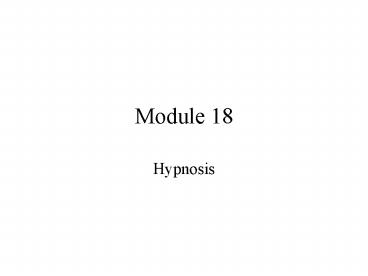Module 18 - PowerPoint PPT Presentation
1 / 10
Title:
Module 18
Description:
Posthypnotic Amnesia: temporary memory loss due to hypnotic suggestion. May not be true amnesia. ... Posthypnotic amnesia and pain relief) ... – PowerPoint PPT presentation
Number of Views:31
Avg rating:3.0/5.0
Title: Module 18
1
Module 18
- Hypnosis
2
Hypnosis
- A social interaction in which one person suggests
to another that certain perceptions, feelings,
thoughts or behaviors will spontaneously occur. - Posthypnotic Amnesia temporary memory loss due
to hypnotic suggestion. May not be true amnesia. - Hypnotized people do not have fantastic abilities.
3
Facts and Falsehoods
- The power of hypnosis lies in the subjects
suggestibility. - Nearly everyone is suggestible (postural sway).
- The most suggestible are those most easily
hypnotized and have rich fantasy lives. - Anyone will experience hypnotic responsiveness if
led to expect it (eg, heavy eyelids).
4
Hypnosis,Recall, and Will
- Research does not support the idea that hypnosis
helps us recall past events. - Findings of age regression (subject relives
experience from childhood) do not support
improved recall. - Hypnotically refreshed subjects often make errors
on the witness stand. - Hypnosis often contaminates memory with false
recollections.
5
- Highly hypnotizable people are vulnerable to
memory suggestions. Eg, UFO abductees. - Orne and Evans (1965) found that people under
hypnosis will carry out dangerous acts. - Authoritative people can induce unhypnotized
people often perform the same acts. - Posthypnotic suggestions Suggestions made during
hypnosis to be carried out when no longer
hypnotized. - Posthypnotic suggestions may feel compulsive and
less effortful.
6
Therapy and Alleviation of Pain
- Hypnosis can be used to harness healing powers
(headaches, asthma, skin disorders, etc.). - However, positive suggestions without hypnosis is
just as effective. - Hypnosis does not seem to benefit problems of
self-control. - Hypnosis may alleviate pain as half of us gain
pain relief from hypnosis.
7
- Dissociation a split in consciousness which
allows thought and behaviors to occur
simultaneously. - Hypnosis dissociates the sensation of pain from
emotional suffering. - Pain relief may be due to selective attention
(eg. athletic injuries). - Under hypnosis, pain is experienced on some
level. Hypnosis does not block sensory input.
8
Social Influence Theory
- Most behaviors induced by hypnosis can be
produced without it. - People dont fake hypnosis, they just do whats
expected of them. - When told hypnosis reflects gullibility, subjects
are unresponsive. - Hypnosis is just an extension everyday behavior.
People play the role of hypnotic subjects.
9
Divided Consciousness Theory
- More than imaginative acting. Sometimes subjects
carry out behaviors on cue when alone. - Hypnosis involves dissociated consciousness.
- There is a separation of some aspect behavior
from conscious control (eg. Posthypnotic amnesia
and pain relief). - They possess a hidden observer who is aware of
whats going on.
10
- Both theories can be combined. Hypnosis is a
combination of social influence and dissociation
of conscious awareness and behavior.































